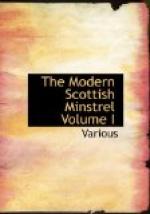Thy praise, bonnie lassie,
I ever could hear of,
And yet, when
to ruse ye the neebour lads try—
Though it ‘s a’
true they tell ye—yet never sae far off
I could see ’em
ilk ane, an’ I canna tell why.
When we tedded the hayfield,
I raked ilka rig o’t,
And never grew
weary the lang simmer day;
The rucks that ye wrought
at were easiest biggit,
And I fand sweeter
scented around ye the hay.
In har’st, whan the
kirn-supper joys mak us cheerie,
‘Mang the
lave o’ the lasses I preed yer sweet mou’;
Dear save us! how queer I
felt whan I cam’ near ye—
My breast thrill’d
in rapture, I couldna tell how.
When we dance at the gloamin’,
it ’s you I aye pitch on;
And gin ye gang
by me, how dowie I be!
There ’s something,
dear lassie, about ye bewitching,
That tells me
my happiness centres in thee.
JAMES MONTGOMERY.
James Montgomery, the spiritual character of whose writings has gained him the honourable designation of the Christian Poet, was born at Irvine, in the county of Ayr, on the 4th of November 1771. His father, John Montgomery, was a missionary of the Moravian Brethren, and in this capacity came to Irvine from Ireland, only a few days before the birth of James, his eldest son. In his fourth year he returned to Ireland with his parents, and received the rudiments of his education from the village schoolmaster of Grace Hill, a settlement of the Moravian Brethren in the county of Antrim. In October 1777, in his seventh year, he was placed by his father in the seminary of the Moravian settlement of Fulneck, near Leeds; and on the departure of his parents to the West Indies, in 1783, he was committed to the care of the Brethren, with the view of his being trained for their Church. He was not destined to see his parents again. His mother died at Barbadoes, in November 1790, and his father after an interval of eight months.
In consequence of his indolent habits, which were incorrigible, young Montgomery was removed from the seminary at Fulneck, and placed in the shop of a baker at Mirfield, in the vicinity. He was then in his sixteenth year; and having already afforded evidence of a refined taste, both in poetry and music, though careless of the ordinary routine of scholastic instruction, his new occupation was altogether uncongenial to his feelings. He, however, remained about eighteen months in the baker’s service, but at length made a hasty escape from Mirfield, with only three shillings and sixpence in his pocket, and seemingly without any scheme except that of relieving himself from an irksome employment. But an accidental circumstance speedily enabled him to obtain an engagement with a shopkeeper in Wath, now a station on the railway between London and Leeds; and in procuring this employment, he was indebted to the recommendation of his former




